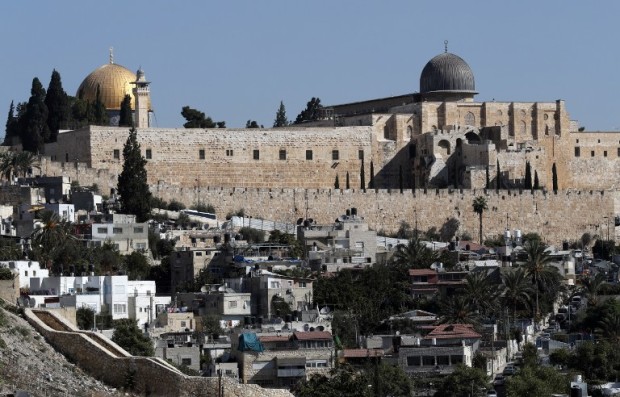
A picture taken on September 19, 2016, shows a part of the Old City of Jerusalem with the rampart, the Dome of the Rock (left) and the dome of the al-Aqsa mosque. AFP
JERUSALEM — Israel recalled its ambassador to UNESCO for consultations Wednesday, Prime Minister Benjamin Netanyahu announced, after a second resolution accused of denying the Jewish connection to Jerusalem.
The UNESCO World Heritage Committee earlier adopted a resolution on the “Old City of Jerusalem and its Walls,” saying it was “deeply concerned” by Israeli building works and archaeological excavations in the city.
The vote comes eight days after UNESCO’s Executive Council backed a resolution on the same theme that infuriated Israel.
“The theatre of the absurd continues and I decided to recall our ambassador for consultation,” Netanyahu said in a statement. “We will decide what the next steps will be.”
“The theatre of the absurd continues and I decided to recall our ambassador for consultation,” Netanyahu said in a statement.
The Israeli ambassador to the UN body, Carmel Shama Hacohen, told public radio that “we are studying the possibility of breaking all contact with UNESCO”.
Despite what an Israeli official called long efforts to get the resolution amended or dropped, the heritage committee, made up of 21 member states, adopted the text proposed by Kuwait, Lebanon and Tunisia.
The resolution refers throughout to the Al-Aqsa Mosque/Al-Haram Al-Sharif religious complex, without using the Israeli name “Temple Mount,” according a copy seen by AFP.
The 14-hectare rectangular esplanade at the southeastern corner of the Old City is the third holiest site in Islam and the most holy in Judaism.
The 14-hectare rectangular esplanade at the southeastern corner of the Old City is the third holiest site in Islam and the most holy in Judaism.
Jews who believe it to be the location of the ancient first and second temples, the latter of which was destroyed in 70 AD.
However the text does not refer to Israel as the “occupying power,” which a similar resolution a year previously had done.
Senior Palestinian figure Saeb Erekat hailed the resolution’s passing, saying it “aims at reaffirming the importance of Jerusalem for the three monotheistic religions, Christianity, Judaism and Islam.”
“Israel has been using archeological claims and distortion of facts as a way to legitimise the annexation of occupied east Jerusalem,” he added.
Papyrus
Israel occupied and later annexed Palestinian east Jerusalem in 1967 in a move never recognized by the international community.
Israel considers all of Jerusalem as its undivided capital, but the Palestinians want the eastern part, including the Old City, as the capital of their future state.
UNESCO is responsible for protecting important heritage sites and is one of few international organizations that recognizes Palestine as a member state.
On 18 October its executive committee confirmed a controversial resolution on “occupied Palestine,” again not mentioning the Temple Mount.
UNESCO chief Irina Bokova distanced herself from that resolution, saying in a statement that “nowhere more than in Jerusalem do Jewish, Christian and Muslim heritage and traditions share space.”
Wednesday’s resolution came on the same day Israeli archaeologists unveiled a 7th century BC text they said contains the earliest mention in Hebrew of Jerusalem outside the Bible.
Wednesday’s resolution came on the same day Israeli archaeologists unveiled a 7th century BC text they said contains the earliest mention in Hebrew of Jerusalem outside the Bible.
The antiquities authority said the papyrus, found near the Dead Sea, proved that “Jews were in this city 2,700 years ago.”
Culture Minister Miri Regev pounced on the find as an opportunity to attack UNESCO.
She said the discovery was proof Jerusalem “has been and will forever remain the eternal capital of the Jewish people”.
Since Palestine being admitted in 2011, UNESCO has been the scene of numerous diplomatic spats resulting from resolutions condemning Israel. CBB